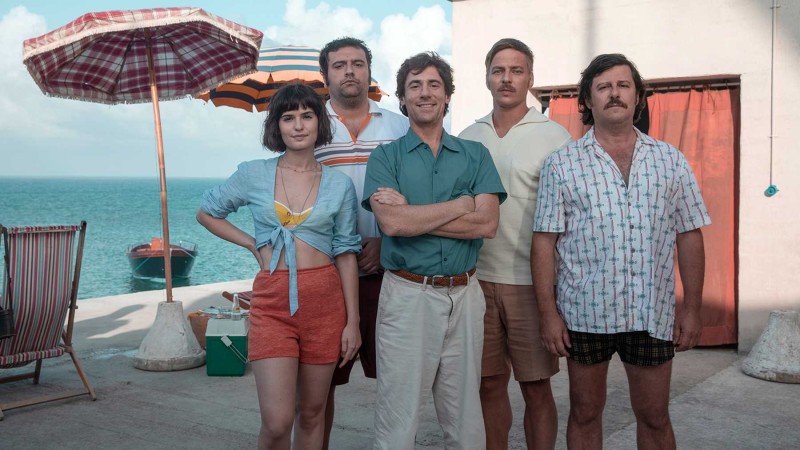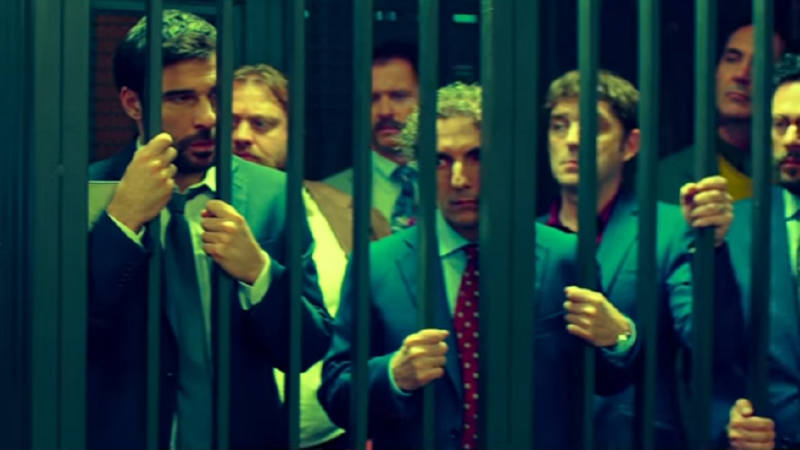There are some stories which, upon hearing them, you can’t help but feel they should be turned into a film. This is how it was for Sydney Sibilia when he learned about the unbelievably true yet seldom remembered case of the Esperantist Republic of Rose Island, founded in May 1968 off the coast of Rimini and sunk some months later in February ’69. And it’s this story of a Utopian land born out of the mind of a visionary, Bologna-born engineer, Giorgio Rosa, which the director of the I Can Quit Whenever I Want (2014) decided to bring to the big screen for Netflix, with production coming courtesy of his close friend Matteo Rovere. The result is Rose Island, an ambitious and well-made film which arguably places too much focus on the ludicrous nature of the story and fails to pay sufficient tribute to the extraordinary feat that inspired it.
The story in itself beggars belief: while the younger generations were fighting to change the world (in the late 1960s), the young engineer played by Elio Germano (crowned Best Actor at 2020’s Berlinale for his part in Hidden Away (Giorgio Diritti) proceeded to build the world that he’d dreamed of, all by himself, constructing a steel platform/island which measured 400 square metres and was located six miles off the Romagna coast, in extraterritorial waters, where the sole existing rule was to be free from any rules. Rosa asked the United Nations to recognise “Rose Island” – which had, in the meantime, become a hallowed destination for dreamers hailing from all around the world – as an independent state. The Italian government were entirely against the initiative. They used force to put an end to Rosa’s adventure, blowing the platform to smithereens in what would come to be known as the only war of aggression ever fought by the Italian Republic.

Writing the screenplay alongside Francesca Manieri (whom he also collaborated with on I Can Quit Whenever I Want 2: Masterclass, 2017, and I Can Quit Whenever I Want 3: Ad Honorem, 2019), Sibilia chooses to endow the entire enterprise with a comic tone, from the very first sequence where we see the Italian engineer chilled to the bone in the lobby of the Council of Europe in Strasbourg, as he waits to be received in order to put forward his case and to assert his position against an Italian state which, in his opinion, is only familiar with one form of freedom: the “conditioned” kind.
What follows is a long flashback retracing the steps which led to the founding of the small Independent State of which Rosa has declared himself President: from his degree in engineering to the creation of “toys which are constantly getting you arrested” – as his enraged ex-girlfriend Gabriella (Matilda De Angelis) describes his inventions – right on through to the spark which is ignited in anarchist and idealist Giorgio’s mind when he happens upon an oil company’s advertising poster (“Our platform, your freedom”).
Wisely shot and visually captivating with its glossy reconstruction of the 1960s, awash with pastel tones and musical hits of the time, the film does, at times, feel somewhat unbelievable, which is ironic given that for all its absurdity, the fundamental story is true. In their slight romanticisation of Rosa’s adventure, the authors have chosen to place focus on the ludicrous side of the tale and to downplay the epic nature of his feat, which ultimately leaves the viewer confused over the real motives behind Rosa’s enterprise. It’s a light-hearted and enjoyable film, but we’re left wondering whether this was really the right tone to adopt in the telling of such an exceptional story.
Rose Island was produced by Groenlandia on behalf of Netflix; the film is available now on Netflix..
This piece was translated from Italian and originally published on Cineuropa.










